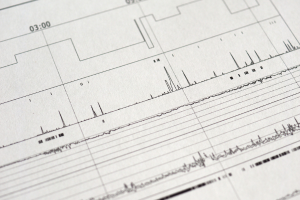Polysomnography (PSG)

What is PSG?
Polysomnography (PSG) is a comprehensive sleep study that records various physiological functions during sleep. It is commonly used to diagnose sleep disorders such as sleep apnea, insomnia, restless legs syndrome, and narcolepsy.
How Does PSG Work?
During a PSG test, multiple sensors are attached to the body to measure brain activity, eye movements, heart rate, breathing patterns, oxygen levels, and muscle activity. These sensors collect data while the patient sleeps, which is then analyzed by sleep specialists to diagnose any abnormalities.
Why is PSG Done?
PSG is performed to evaluate and diagnose several sleep-related disorders, including:
- Obstructive Sleep Apnea (OSA) – A condition where breathing repeatedly stops and starts during sleep.
- Insomnia – Difficulty falling or staying asleep.
- Narcolepsy – A neurological disorder that affects sleep-wake cycles.
- Restless Legs Syndrome (RLS) – An uncontrollable urge to move the legs, often disrupting sleep.
- Parasomnias – Abnormal behaviors during sleep, such as sleepwalking or night terrors.
- Periodic Limb Movement Disorder (PLMD) – Involuntary leg movements that disturb sleep.
How to Prepare for a PSG Test?
Preparing for a PSG test is simple, but a few things should be kept in mind:
- Avoid Caffeine and Alcohol – These substances can affect sleep patterns.
- Follow Regular Sleep Schedule – Try to maintain a consistent sleep routine before the test.
- Avoid Naps – Refrain from taking naps on the day of the test.
- Clean Hair and Skin – Avoid using oils, lotions, or makeup as they can interfere with sensor placement.
What Happens During a PSG Test?
- The patient arrives at the sleep center in the evening.
- A technician attaches sensors to the scalp, chest, legs, and finger to monitor various physiological functions.
- The patient sleeps in a quiet, comfortable room while the data is recorded.
- The technician may wake the patient to adjust sensors if necessary.
- The test usually lasts for an entire night, and the patient can leave in the morning.
Are There Any Risks Involved?
PSG is a safe and non-invasive test. The only discomfort may be from the sensors and wires, which may cause mild irritation or slight difficulty in sleeping. However, the data obtained from PSG provides valuable insights into sleep health and helps in effective treatment planning.
Understanding PSG Results
The recorded data is analyzed by a sleep specialist, who evaluates sleep stages, breathing patterns, and other physiological activities. Based on the findings, the doctor may recommend further tests or specific treatments, such as CPAP therapy for sleep apnea.

Services
- Consultation for all mental health disorders
- Depression and mood disorders
- Anxiety
- Alcohol, opioid, cannabis addictions
- Screen and Phone addictions
- OCD
- PTSD
- Schizophrenia and other psychotic disorders
- Insomnia
- Eating disorders
- Personality disorders
- Unexplained behavioural changes
- Anger outbursts
